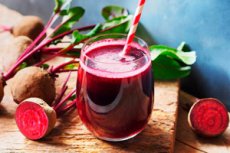New publications
Beetroot juice lowers blood pressure in older adults by altering the oral microbiome
Last reviewed: 27.07.2025

All iLive content is medically reviewed or fact checked to ensure as much factual accuracy as possible.
We have strict sourcing guidelines and only link to reputable media sites, academic research institutions and, whenever possible, medically peer reviewed studies. Note that the numbers in parentheses ([1], [2], etc.) are clickable links to these studies.
If you feel that any of our content is inaccurate, out-of-date, or otherwise questionable, please select it and press Ctrl + Enter.

The blood pressure-lowering effects of high-nitrate beetroot juice in older adults may be linked to certain changes in their oral microbiome, according to the largest study of its kind.
Scientists from the University of Exeter conducted a study published in the journal Free Radical Biology and Medicine, comparing the responses of a group of older adults with those of younger adults. It has previously been shown that a diet high in nitrates can lower blood pressure, which helps reduce the risk of cardiovascular disease. The article is titled: "Aging alters the oral microbiome, nitric oxide bioavailability, and vascular responses to dietary nitrate supplementation."
Nitrates are vital to the body and are consumed as a natural part of a vegetable diet. When older participants drank concentrated beetroot juice twice a day for two weeks, their blood pressure dropped — an effect not seen in the younger group.
A new study provides evidence that this result was likely due to the suppression of potentially harmful bacteria in the mouth.
An imbalance between beneficial and harmful oral bacteria may reduce the conversion of nitrates (abundant in a vegetable diet) into nitric oxide. Nitric oxide plays a key role in the healthy functioning of blood vessels and, therefore, in the regulation of blood pressure.
Study author Professor Annie Vantalo, from the University of Exeter, said:
"We know that a diet rich in nitrates has health benefits, and as people age, they produce less of their own nitric oxide. Older people also tend to have higher blood pressure, which can be linked to cardiovascular complications such as heart attack and stroke.
Encouraging older adults to eat more nitrate-rich vegetables may have significant long-term health benefits. The good news is that if you don’t like beets, there are plenty of other nitrate-rich alternatives, such as spinach, arugula, fennel, celery, and kale.”
The study involved 39 adults under 30 years of age and 36 adults aged 60 to 70 years, recruited through the NIHR Exeter Clinical Trials Research Centre. The study was supported by the Exeter Clinical Trials Unit.
Each group spent two weeks taking regular doses of nitrate-rich beetroot juice and two weeks on a placebo version of the juice from which the nitrates had been removed. Each condition was preceded by a two-week “washout period” to reset the effects. The team then used a method called bacterial gene sequencing to analyze which bacteria were present in the mouth before and after each condition.
In both groups, the composition of the oral microbiome changed significantly after drinking nitrate-rich beetroot juice, but these changes differed between younger and older participants.
In older adults, there was a significant reduction in Prevotella bacteria in the mouth after drinking the juice, and an increase in bacteria known for their health benefits, such as Neisseria. The older group had higher mean arterial pressure at the start of the study, which was reduced by drinking the nitrate-rich beetroot juice but not by taking the placebo.
Study co-author Professor Andy Jones, from the University of Exeter, said:
"This study shows that nitrate-rich foods alter the oral microbiome in a way that may lead to reduced inflammation and lower blood pressure in older adults. It opens the door for larger studies to examine the impact of lifestyle factors and biological differences on the body's response to dietary nitrate supplementation."
Dr Lee Beniston, Deputy Director of Industrial Partnerships and Collaborative R&D at BBSRC, added:
“This study is an excellent example of how bioscience can help us better understand the complex links between diet, the microbiome and healthy aging.
By identifying how dietary nitrate impacts oral bacteria and blood pressure in older people, the study opens up new opportunities to improve vascular health through nutrition. BBSRC is proud to support this innovative partnership between academic researchers and industry to advance knowledge with real benefits."
